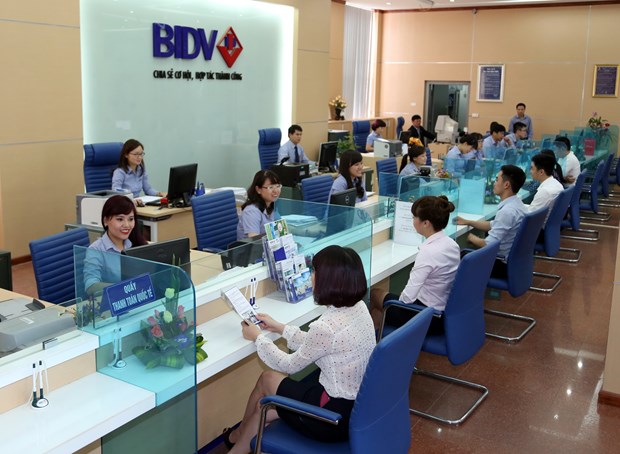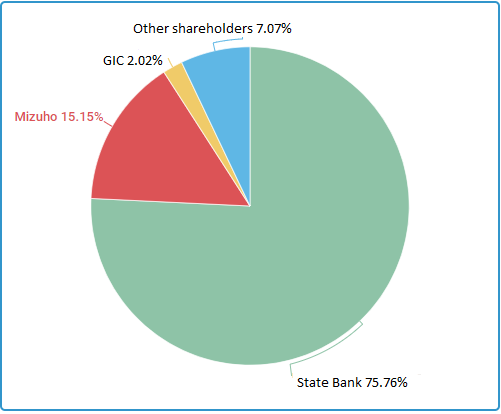Domestic commercial banks seek ways to increase charter capital
 Transactions at the Joint Stock Commercial Bank for Investment and Development of Vietnam (BIDV) (Photo: VNA)
Transactions at the Joint Stock Commercial Bank for Investment and Development of Vietnam (BIDV) (Photo: VNA)
Hanoi (VNA) – Four banks are seeking all possible ways to increase charter capital and some of them have succeeded but they found it not easy.
The pressure to raise the “risk buffer” of the banking sector has become more urgent as the deadline for the application of Basel II risk management standards is approaching.
Actively seeking a way out
Right at the beginning of the year, the Joint Stock Commercial Bank for Foreign Trade of Vietnam (Vietcombank) received good news when it successfully sold 94 million shares, equivalent to a 2.55 percent stake of Vietcombank, to Singapore’s sovereign wealth fund GIC after three years of negotiations. Besides, Vietcombank also sold an additional almost 17 million shares to its strategic partner Mizuho Bank, raising its total stake in Vietcombank to 15 percent.
[Selling shares to foreign investors, VCB’s charter capital up]
After selling shares to GIC and Mizuho, Vietcombank raked in 6.2 trillion VND and its charter capital increased to 37.1 trillion VND (around 1.6 billion USD), laying a firm foundation for the bank to meet Basel II capital safety standards and affirm its leading position in the country’s banking industry.
Following the two deals, the State’s capital ownership in Vietcombank was reduced from 77.11 percent to 74.8 percent. The rate remains huge, meaning that there is great room for Vietcombank to sell more shares in the future in line with its development stages and capital needs.
With its capital hike, Vietcombank is expected to get a higher credit growth quota, helping it to have more capital and favourable conditions to develop in 2019 and beyond.
 Stakeholders of Vietcombank by the end of 2018 (Source: VietnamPlus)
Stakeholders of Vietcombank by the end of 2018 (Source: VietnamPlus)The Joint Stock Commercial Bank for Investment and Development of Vietnam (BIDV) is currently a listed state-owned bank with the highest state ownership rate, standing at over 95 percent. Over the past eight years, BIDV has sought strategic partners to sell shares but it failed. The door is opening when BIDV recently signed a strategic cooperation agreement with KEB Hana Bank of the Republic of Korea. However, the details of the deal haven’t been disclosed yet.
Experts of Bao Viet Securities Company said: “The deal is in the process of approval. If the deal comes to a success, it would be an important factor for BIDV to approach Basel II standards.”
But BIDV has just “breathed a sigh of relief” after the bank successfully issued 1 trillion VND worth of bonds to raise its charter capital.
Tran Quoc Khanh, Chairman of the Council of Members of the Vietnam Bank for Agriculture and Rural Development (Agribank), said the bank has just issued 4 trillion VND worth bonds to mobilise capital for farmers. Agribank’s employees contributed remarkably to the bank’s capital hike, he said.
Meanwhile, the Vietnam Joint Stock Commercial Bank for Industry and Trade (VietinBank) is unlikely to raise charter capital as the State ownership in the bank had been reduced to the minimum level (65 percent). The issuance of additional bonds to existing stakeholders is also infeasible as the State plans to not pour more investment into the banking sector. VietinBank is now expecting policy changes regarding the payment of dividends and reduction of State capital ownership.
Efforts of authorized agencies
Deputy Governor of the State Bank of Vietnam (SBV) Nguyen Kim Anh said the capital hike of State-owned commercial banks is an urgent matter. She herself signed at least three documents for submission to relevant ministries and sector as well as the government, asking for permission to increase capital of State-owned commercial banks, especially VietinBank.
According to the Deputy Governor, leaders of the SBV and government clearly understood that this is an urgent need of the banks but competent ministries and sectors have yet to reach consensus on the issue. Therefore, Prime Minister Nguyen Xuan Phuc planned to have a meeting with representatives of the relevant ministries and sectors after attending a conference reviewing the banking industry’s performance in 2018.
Anh suggested that the banks should not only focus on credit but also diversify banking products and services. The target of raising the proportion of non-credit revenue in the coming time is another challenge, she said.
In fact, the story about the payment of dividends in shares or cash by State-owned commercial banks had been previously mentioned. In 2016, BIDV and VietinBank put forth the proposal which was denied by the Ministry of Finance.
A member of the National Financial and Monetary Policy Advisory Council said the state budget collection has been improved so the State now should allow the banks to pay dividends in shares.
Dr. Can Van Luc said the State should create optimal conditions for State-owned commercial banks to increase capital and this is also an important content of Project 1058 which was designed to restructure and settle bad debts of credit institutions.
Luc also emphasized the need to speed up the approval of foreign strategic investors as they do not want to wait for a long time and Vietnamese banks might miss important opportunities. Calling for foreign investment is now considered the fastest way as it is difficult to find out domestic institutions with strong financial sources to pour capital into banks like in the past, he said.-VNA











